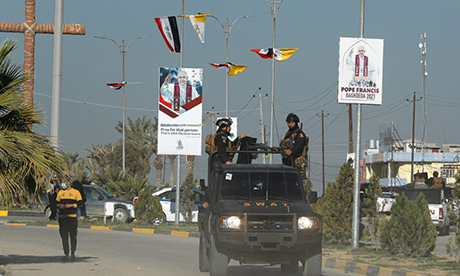Despite concerns over terrorist attacks and a surge in COVID-19 cases, the pope’s Iraq visit will proceed with hopes of promoting peaceful coexistence in the troubled nation.
Recent attacks on U.S. bases in Iraq, coupled with missile attacks in February on areas the pope will visit, have led some Vatican observers to question the safety of the papal visit.
Cases of COVID-19 have tripled to nearly 5,000 in the country in the past month.
While Francis and his entourage have been vaccinated against COVID-19, journalists questioned the wisdom of holding Masses and other appearances. The pope is expected to attract large crowds creating potential super-spreader events.
Vatican spokesperson Matteo Bruni told reporters that the pope will not be encountering large crowds in Iraq. He called Pope Francis’ determination to make the trip “an act of love for this land, this country, and its people.”
Admitting that acts of love “might be a bit extreme,” Bruni emphasized that the pope is being realistic. He will ride in a bulletproof car during the trip, casting aside the usual open “popemobile”. Social distancing will be enforced throughout the pope’s Iraq visit.
Francis “wishes to be near Christians and those who suffered and hopes the trip will open the door to the future for the Iraqi people,” Bruni said.
Iraqis return the sentiment, according to Davide Bernocchi, the country representative for Iraq for the charitable group Catholic Relief Services. “Iraqis understand that the pope is making a brave gesture by coming here,” Bernocchi told Religion News Service. “Given the safety situation and COVID, this visit means so much for this country and this people,” he added.
Before 2013, there were roughly 1.4 million Christians living in this area, but following the rise of the Islamic State in the region, the number fell to just over 300,000. Those who braved the political and social instability in Iraq are now left with a struggling economy and discrimination.
“Christians represent a traumatized community. They need someone to show them the way toward the future once more,” Bernocchi said.
